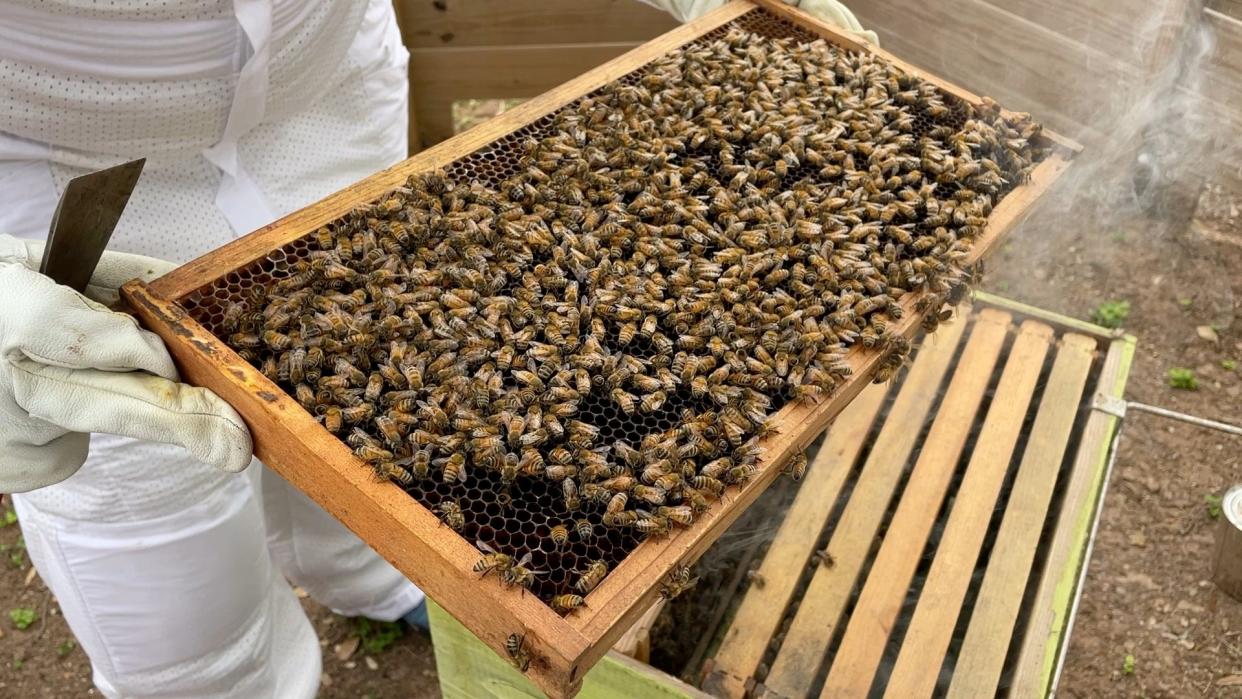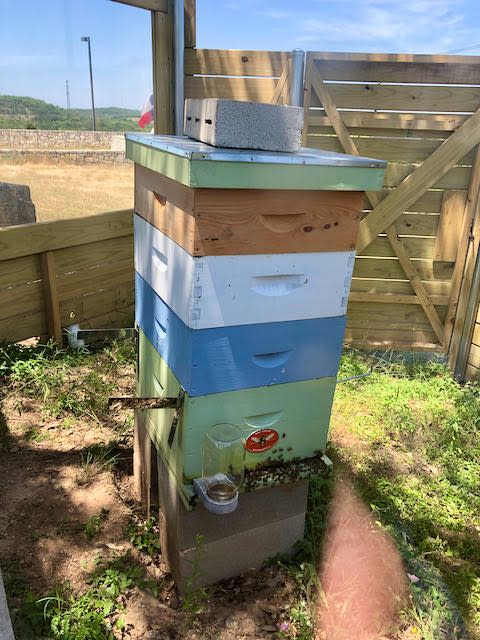Westbank libraries: Beehive supports ecosystem, learning

What’s the buzz at Westbank and Laura’s Libraries?
The last time you were at Laura’s, you may not have noticed the unassuming enclosure sitting on the hillside near the library housing a hive of honeybees. If you saw it at all, you would have little hint about the fascinating and important work going on within its walls. But if you ask anyone on the library’s Bee Team, you’ll hear about the lives of those bees, just as exciting as any soap on daytime TV.
“Lately we’ve had a little drama around our queen bee,” said Bree DiQuinzio, a public service assistant at the library.
DiQuinzio recently has taken the lead in caring for the hive, newly repopulated following the loss of the library’s initial colony in the freeze of February 2021.
“Our new gals are Italian/Cariolan hybrids,” DiQuinzio explained. “They’re a gentler variety, so they should keep humming happily along if you decide to take a peek at the enclosure and say ‘Buongiorno.’”
Although this variety of bees is known to be relatively mellow, they already have had their fair share of drama. Just a month into settling into their new home, the bees usurped the throne, replacing the queen the library had installed with a new one.
What does this plot twist mean for the health of the hive?
“A purchased queen only has access to selected drones as mates,” DiQuinzio said. “But in the wider world, there’s a lot more variation. We’ll be keeping an eye on the hive to make sure our queen didn’t take up with some kind of bee outlaw, thus predisposing her daughters to hooliganry. So far it seems like we’re in the clear. Our current queen seems to be doing her job and the hive looks healthy, so we’re happy to have her.”

Librarian Alex Meyers, who is passionate about ecology and bees, was responsible for bringing the initial colony to Westbank.
"I was our community garden coordinator, and the idea came to us that hosting a honeybee hive would fit nicely with the garden’s mission and would be a great way for the library to support honeybees, which are so critical to our food system and ecology.”
She and her mentor Roger Grape, an experienced beekeeper and school librarian at Blackshear Elementary, installed a new colony near the Westbank library’s community garden in May 2017. However, by 2020 it had become apparent that the hive should be moved.
“We realized that Laura’s Library, with its wide-open fields chock full of wildflowers, and its location far away from speeding vehicles, would be an even better spot for the hive. So, in February 2020, the Bee Team undertook the relocation mission.”
This move from Westbank to Laura’s is a favorite memory of Elena Carvajal, the library’s collections manager who used to be involved with the keeping of the bees.
“The move had to be done in the dark after the bees returned from foraging,” Carvajal said. “We had a caravan, driving slowly to Laura’s Library. The hive was very heavy, and Super Bowl Sunday meant that there was less traffic.”
Meyers added, “We were creeping along quite slowly with our hazards on and the hive ratchet-strapped into the back of my pickup truck, all of us wearing our bee suits. I’m sure we looked quite strange.”
For a year, the hive thrived in its new spot.
“We were even able to harvest a modest batch of honey and sell jars to the public, with proceeds going to the library,” Meyers said. “Heartbreakingly, the colony froze to death during the historic winter storm of 2021. But nature abhors a vacuum, and after a year-long hiatus, we installed a new hive in April.”
Although Meyers has since taken on an advisory role to the hive, two of the library’s newest librarians, Erin McLaughlin and Alex Beck, have joined DiQuinzio in caring for the bees.
McLaughlin described entering the bee enclosure as a “Zen kind of experience.”
“Weirdly, I’m not a big bug person,” she said. “But I’ve never felt scared of the bees.”
This was seconded by Meyers, who said, “There’s this gentle hum, and it’s so peaceful.”
McLaughlin said that her biggest achievement in her work with the hive so far has been “spotting the queen bee when she had been AWOL for a week or two.”
“It was awesome to pick her out of a crowd, since that meant our hive was doing well.”
Beck and McLaughlin both spoke of bees’ crucial role as pollinators.
“They are vital to many aspects of our ecosystem,” Beck said, explaining that bees increase the biodiversity of the area.
His favorite fun fact about bees is that the flavor of the honey they produce is directly impacted by the types of flowers from which they gather their nectar.
“This means that no two types of honey will ever taste exactly the same,” he said. “When you consume honey, you’re getting a small smorgasbord of the local ecosystem where it was produced.”
To observe the library’s hive for yourself, take a look through the windows of the enclosure next to Laura’s Library. Also check the library’s Facebook page for updates about the hive’s progress, suggested books about bees for every age, and tips for what you can do to help honeybees. You might find yourself developing a passion for these tiny creatures and the ecosystem they help to support.
“Since getting into beekeeping, I feel so much more connected to the natural world,” Meyers said. “Learning about bees is a wonderful antidote for cynicism.”
Maureen Turner Carey is a public service and PR librarian at the Westbank Community Library District.
This article originally appeared on Austin American-Statesman: Westbank libraries: Beehive supports ecosystem, learning

